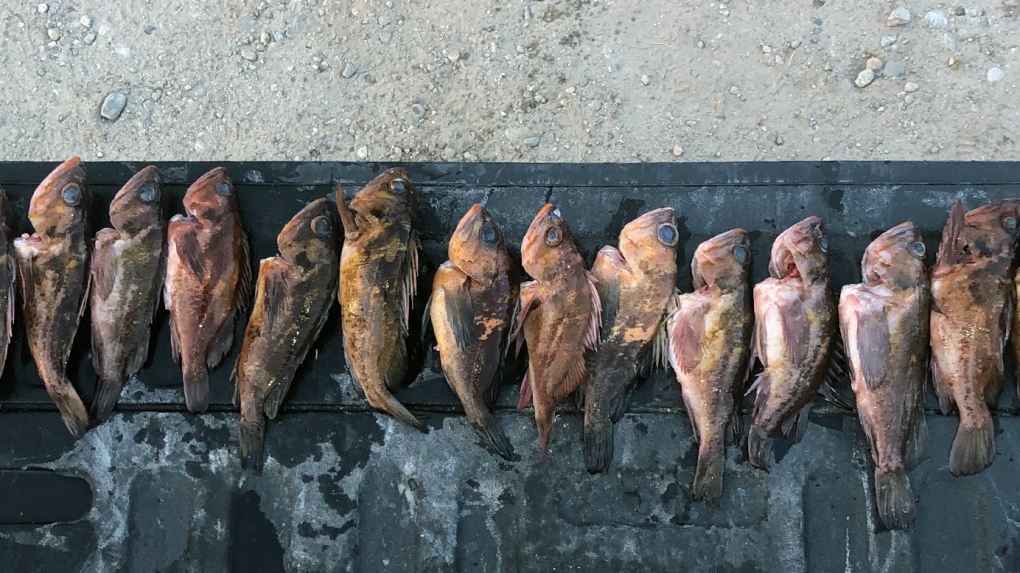Fishers fined $29K, banned from B.C. fishing lodge for illegal catches
 Some of the rockfish catch pictured in a photo that was used as evidence in the trial. (DFO)
Some of the rockfish catch pictured in a photo that was used as evidence in the trial. (DFO)
Three people, including the operator of a British Columbia fishing lodge, have been fined $29,000 after they were found guilty last month of multiple fishing-related offences.
Provincial court records show Yu Rang Tang, Bai Jia Ye and Sheng Hui Zhao were all convicted on Feb. 8 of possessing more than twice the daily quota of clams, and for possessing a prohibited clam species. Ye was also found guilty of an additional charge of possessing more than twice the daily quota of rockfish.
The charges stem from a Fisheries and Oceans Canada investigation that began in September 2022.
The federal agency says its officers were on patrol in Egmont, B.C., when they saw three people fishing from the dock of a fishing lodge that is also a private home.
During the inspection, the officers found the recreational fishers had together caught 14 rockfish, 969 Manilla clams, one oyster, 83 varnish clams and 12 butter clams, according to a DFO release last week.
The agency says the butter and varnish clams were prohibited from harvest at that time due to potential contamination, while the daily limit of rockfish for a licensed angler is one fish per day and the daily limit for clam fishing is 60 clams per day.
The officers seized all of the fish and shellfish as evidence, according to authorities.
Along with the fines, the three fishers were handed fishing prohibitions and were banned from attending the fishing lodge for periods of one to two years, according to the DFO.
"The significant fines and prohibitions handed down in this case underscore the seriousness of violating fishing rules and regulations under Canada’s Fisheries Act intended to protect and preserve at-risk fish populations," the DFO said in the release.
The agency says excessive harvesting continues to pose a significant risk to the sustainability of Canada's aquatic ecosystems.
Rockfish species are especially susceptible to overfishing, according to the DFO, because they are slow to grow and reproduce, staying close to their home habitats over their lifespans, which average about 75 years.
CTVNews.ca Top Stories

Trump promises a 25% tariff on products from Canada, Mexico
U.S. president-elect Donald Trump said on Monday that on his first day in office he would impose a 25 per cent tariff on all products from Mexico and Canada, and an additional 10 per cent tariff on goods from China, citing concerns over illegal immigration and the trade of illicit drugs.
'Devastating:' Ford warns of impact of new tariffs promised by Donald Trump
Ontario Premier Doug Ford is warning that Donald Trump’s promise to impose a 25 per cent tariff on goods arriving in the United States from Canada and Mexico could have a 'devastating' effect on the province’s economy.
Legault says Trump's 25 per cent tariff would pose 'huge risk' for Quebec, Canadian economies
Premier François Legault says President-elect Donald Trump's threat of a 25 per cent tariff on all imports would pose a 'huge risk' to the Quebec and Canadian economies.
Premiers seek 'urgent' meeting with Trudeau before Trump returns to White House
Canada's premiers are asking Prime Minister Justin Trudeau to hold an urgent first ministers' meeting ahead of the return to office of president-elect Donald Trump.
Here's how much Alberta exports to the United States
With the United States being Alberta’s top trade partner, sweeping 25 per cent tariffs proposed by President-Elect Donald Trump could have a major effect on the province’s economy.
'It's just not fair': Retirees speak out on being excluded from federal rebate cheques
Carol Sheaves of Moncton, N.B., says it's not fair that retirees like her won't get the government's newly proposed rebate cheques. Sheaves was among the seniors who expressed their frustrations to CTVNews.ca about not being eligible for the $250 government benefit.
NDP support for part of Liberal relief package in question, as House stalemate persists
After telling Canadians that New Democrats would back Prime Minister Justin Trudeau's holiday affordability package and help pass it quickly, NDP Leader Jagmeet Singh now wants it split up, as he's only ready to support part of it. Public Services Minister Jean-Yves Duclos said the Liberals are 'certainly open to working with the opposition parties,' to find a path forward.
Deer spotted wearing high-visibility safety jacket in Northern B.C.
Andrea Arnold is used to having to slow down to let deer cross the road in her Northern B.C. community. But this weekend she saw something that made her pull over and snap a photo.
Canadian Army corporal fined for stolen valour at Remembrance Day ceremony
A corporal in the Canadian Army has been fined $2,000 and given a severe reprimand for wearing service medals he didn't earn during a Remembrance Day ceremony in Alberta two years ago.































